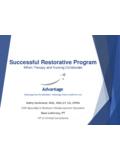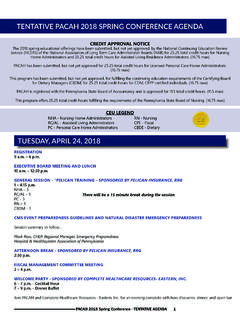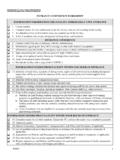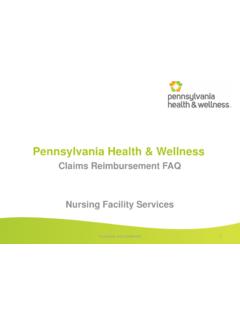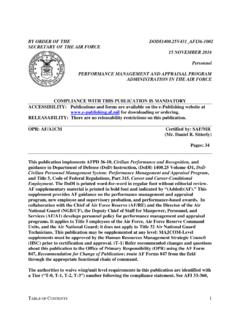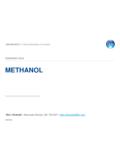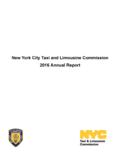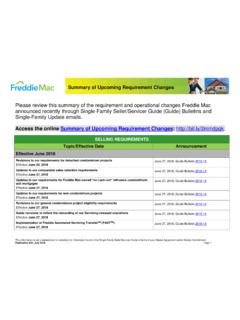Transcription of November 28, 2016 Implementation Effective …
1 CMS New Requirements of Participation: Phase One Implementation Effective November 28, 2016 Paula G. Sanders, EsquirePost & Schell, Pennsylvania Coalition of Affiliated Healthcare & Living CommunitiesWebinarNovember 3, 2016 New Requirements Of Participation (RoPs) Published October 4, 2016 (81 Fed. Reg. 68688) Available at First comprehensive update since 1991 CMS estimated cost per SNF Year 1: ~ $62,900 Subsequent years: ~$55,000481 Fed. Reg. 688442 CMS: Themes Of The RoPs Person-centered care Quality Facility assessment, competency-based approach Comprehensive review & modernization Implementation of legislative requirements3 Survey Implementation Phase 1: Effective November 28, 2016 Surveyor training November 18, 2016 Same survey process New RoPs will be merged into existing F-tags Phase 2.
2 Effective November 28, 2017 New Appendix PP (State Operations Manual, SOM) with all new F-tags New survey process combines traditional & Quality Indicator Survey (QIS) 4 Multi-Phase Implementation Of RoPs Phase 1: November 28, 2016 Phase 2: 1 year following the Effective date of the final rule (Nov. 28, 2017) Phase 3: 3 years following the Effective date of the final rule ( November 28, 2019) Qualifications for dietary manager Up to 5 years567 New Definitions abuse adverse event exploitation misappropriation of resident property mistreatment neglect person-centered care resident representative sexual abuse 8 Phase 1.
3 Highlights Resident rights/facility responsibilities combined and expanded Drug regimen review process more detailed Must have discharge planning process & plan for all residents Person-centered care plan More extensive resident assessment process Must include CNA and dietary worker PASARR incorporated into assessment, care plan and discharge plan New behavioral health services ( ) Pre-dispute Binding Arbitration Agreements prohibited9 Phases 2 And 3: Highlights Added quality assurance and performance improvement (QAPI) Added compliance and ethics section Greater monitoring and documentation related to appropriateness of meds Psychotropic & antibiotic stewardship Require Infection Control Program & Infection Preventionist Added a staff competency requirement to determine nursing staffing levels Based on a facility assessment, which includes but is not limited to the number of residents, resident acuity, range of diagnoses, and the content of individual care plans.
4 Require facility provide behavioral health care and services training (for patients with trauma)10 Definitions Person-centered care focus on resident as locus of control and support resident in making own choices and having control over daily lives Resident representative individual chosen by resident to act on behalf of resident; person authorized by State or Federal law Review PA Act 169 Right to access medical, social or other personal information of the resident11 Resident Rights Includes facility responsibilities Resident must receive information (oral and written) in language that he or she can understand about various topics, including medical condition Consider also Section 1557 of Affordable Care Act (ACA) : Facility must have policies and procedures (P&Ps) re.
5 Visitation rights of resident, including any clinically necessary or reasonable restriction or limitation or safety restriction or limitation when consistent with the regulations12 Resident Rights Facility acts as fiduciary if resident deposits personal funds Facility must have a grievance policy and a Grievance Official Must also have a grievance officer under Section 1557 of the ACA13 Resident Grievance Rights Right to voice grievances without discrimination or reprisal and without fear of discrimination or reprisal Includes care and treatment which has been furnished as well as that which
6 Has not been furnished Behavior of staff and of other residents Other concerns regarding their stay14 Resident Grievance Rights SNF Duties Make prompt efforts to resolve grievances Provide residents with information on how to file a grievance or complaint Establish a grievance policy to ensure the prompt resolution of all grievances Must give copy of grievance policy to resident upon request15 Grievance Policy Address Resident Rights Notifying resident individually or through postings in prominent locations throughout facility of right to file grievances orally (meaning spoken) or in writing Right to file grievances anonymously Contact information of the grievance official with whom a grievance can be filed Name, business address (mailing and email)
7 And business phone number16 Grievance Policy Address Resident Rights Reasonable expected time frame for completing review of grievance Right to obtain a written decision regarding his or her grievance Contact information of independent entities with whom grievances may be filed17 Grievance Policy Grievance Official Identify a Grievance Official and responsibilities Overseeing the grievance process Receiving and tracking grievances through to their conclusion Leading any necessary investigations Maintaining confidentiality of all information associated with grievances Issuing written grievance decisions to resident Coordinating with state and federal agencies as necessary in light of specific allegations18 Grievance Policy Decisions All written grievance decisions must include.
8 Date the grievance was received Summary statement of the grievance Steps taken to investigate the grievance Summary of pertinent findings or conclusions Statement whether grievance was confirmed or not confirmed Any corrective action taken or to be taken Date the written decision was issued19 Grievance Policy Corrective Action Taking appropriate corrective action in accordance with State law if the alleged violation of the residents rights is confirmed by the facility or if an outside entity having jurisdiction, such as the State Survey Agency, Quality Improvement Organization, or local law enforcement agency confirms a violation of any of these residents rights within its area of responsibility20 Grievance Policy Log Must maintain evidence demonstrating the results of all grievances for a period of no less than 3 years from the issuance of the grievance decision Consider whether to combine RoP Grievance Log with OCR Grievances21 Freedom From Abuse, Neglect.
9 And Exploitation Review P&Ps for consistency with new definitions and requirements Prohibits hiring anyone with a disciplinary action in effect against professional license by a state licensure body as result of a finding of abuse, neglect, exploitation, mistreatment of residents or misappropriation of resident property Impact of Pennsylvania s Protective Services Laws (OAPSA, APSA, CPSL)?22 Admission, Transfer, And Discharge Rights Heightened emphasis on discharge planning Phase 2 Implementation Transfer/Discharge Documentation Establish and implement (or review/revise)
10 Admission policy Requires orientation of resident for transfer or discharge to ensure safe and orderly transfer or discharge Review/revise/create written policy on permitting residents to return after hospitalization or therapeutic leave Include specific provisions outlined in regulation23 Comprehensive Person-Centered Care Planning Specific information must be included in comprehensive care plan Plan must be developed within 7 days after completion of the comprehensive assessment Requires IDT preparing plan to include Nurse aide with responsibility for the resident Member of food and nutrition services staff If participation of resident and representative in development of plan not practicable, explanation must be in resident s medical record24 Comprehensive Person-Centered Care Planning.
